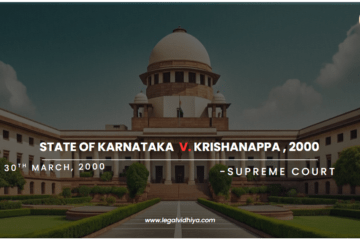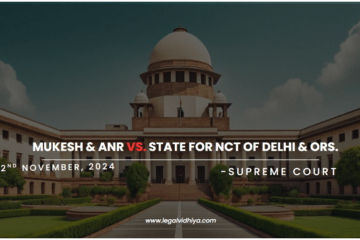
| CITATION | 1965 AIR 1082, 1965 SCR (1) 112. |
| DATE OF JUDGEMENT | 10/11/1964 |
| COURT | SUPREME COURT OF INDIA |
| APPELLANT | K. L. JOHAR AND COMPANY |
| RESPONDENT | DEPUTY COMMERCIAL TAX OFFICER |
| BENCH | WANCHOO, K.N. BENCH:WANCHOO, K.N.GAJENDRAGADKAR, P.B. (CJ)HIDAYATULLAH, M.DAYAL, RAGHUBARMUDHOLKAR, J.R. |
INTRODUCTION
K.L Johar and Company. v/s Deputy Commercial Tax Officer 1964 is a remarkable case that took place in the Indian judicial system. The parties in the case are K.L Johar and Company as appellants, and deputy commercial tax officer as respondent. The case is attributed to a legal dispute in relation to a hire purchase transaction between K.L. Johar and the company and the deputy commercial tax officer. Where K.L. Johar and company acts as the financier which pays the vendor the full value of the automobile and signed into a contract with the clients who were later compelled to reimburse the price plus interest in regular instalments. The year 1964 signifies the year in which the case was decided by the admissible court.
FACTS OF THE CASE
The appellant in this case is a funding firm comprised of several partners. Its primary business is to lend money to those who want motor vehicles but don’t have the cash on hand to pay the whole amount. The appellant’s business plan is to get into rental-purchase contracts with those looking at buying motor vehicles. To appreciate the concerns presented in these hearings, it is important to look to the conditions of hire-purchase contracts that follow a fixed pattern. Anyone interested in purchasing a motor vehicle chooses, types, and negotiates the cost with the vehicle’s retailer. Such a person subsequently seeks the appellant for hire-purchase financial help. Occasionally a single payment is paid to the motor dealer, which is deducted from the hire-purchase contract, while other times the sum of money is given to the appellant in a series of instalments. In either event, the appellant pays the cost or the remaining balance to the dealer, and the hire-purchase agreement is subsequently entered into among the appellant and the individual who wishes to purchase the motor vehicle. The agreement refers to the appellant as the proprietor of the car and the person who wishes to buy it as the one who hired it.
The typical procedure comprised the appellant giving the dealership the price of the vehicle and then renting it to the potential buyer. The latter was forced to pay the higher amount in installments, and upon completion of all payments in line with the agreement, he was provided with the option to acquire the automobile for the final amount of Rs 1/-. The lease-purchase agreement stated unequivocally that the car would stay in the appellant’s possession for the term of the hire. The appellant was charged sales tax by the Madras sales tax authorities for the assessment years 1955-56 and 1956-57. Under section 2 (h) of the Madras General Sales Tax Act of 1939, the hire buy transaction was classified as a sale transaction.
The appellant established an organization in February 1955 and, during that time, entered into multiple hire-purchase arrangements involving both new and used motor vehicles. On the 28th of April 1956, the appellant filed a return with the Associate Commercial Tax Officer in Coimbatore, indicating a sales tax turnover of Rs. 2,37,993/- over the fiscal year 1955-56. The appellant additionally acquired (albeit it now alleges that it did so incorrectly) from motor vehicle hirers amounts equivalent to a tax on sales on their transactions, which were held in a reserve account. The hirers, on the other hand, sought to seek a refund of this sum, claiming that hire-purchase agreements did not fall under the definition of “sale” as stated in the Madras General Taxation of Sales Act, No. IX of the year 1939. However, the assisting Commercial Tax Sergeant established a provisional assessment based on the appellant’s return and set up instalments for payment. The appellant settled each instalment but requested a revision from the Commercial Tax Officer, arguing such rental-purchase contracts were not sales activities subject to taxation under the Act.
The vehicle was intended kept entirely the possession of its proprietor until it became a possession of the hirer within the terms of the agreement, and the hirer possessed no claim to or interest in it apart from as the vendor under the terms of the contract.
Some covenants of the agreement were:
- The appellant was described in the agreement as the owner of the vehicle.
- To keep the vehicle in good and serviceable condition to the satisfaction of the owner.
- In the event of an accident or otherwise causing total loss of the vehicle, the hirer was compellable to pay full amount of vehicle to the appellant.
ISSUES RAISED
- Whether there were actually two transactions in the matter or only single sale, since the appellant’s claim appeared to be based on the fact that there was simply a single transaction by the seller to the person?
- Who wanted to buy the car, and the appellant was just a financial authority for that person?
- What is the monetary value of the transaction that is eventually affected?
CONTENTIONS OF THE PLAINTIFF
- There was really one sale in the present case by the motor dealer to the indenting purchaser of the vehicle, the appellant being the mere financing agent there was no transaction of sale between the appellant and the intending purchaser.
- The Hire purchase contracts are deemed sales because they don’t fit within the scope of sale transactions, as defined in the Indian Sale of Goods Act.
- The Hire purchase agreement is in the nature of a bailment and not a sale, with the appellant holding a reversionary ownership stake in the vehicle and the hirer being subject to all the rights and liabilities of a bailee.
- In any case sale took place only when the option to purchase was exercised by the hire by the payment of Rs. 1/- which should therefore be taken as the sale price.
CONTENTIONS OF THE RESPONDENT
- The appellant was identified in the contract as the vehicle’s owner, and the customer was identified as the hirer. Until the vehicle was designated as the hirer’s property in accordance with the terms of the contract, the owner was to retain ownership of the vehicle in its entirety, and the person who hired it had no other rights or interests in the vehicle.
- To the owner’s satisfaction, the hirer was required to keep the car in excellent working order.
- Additionally, the hirer is responsible for paying any applicable taxes, license fees, duties, fines, registration costs, and other fees related to the vehicle.
- The car cannot be sold, financed, pledged, assigned, or otherwise relinquished by the hirer.
JUDGEMENT
HIGH COURT:
The High Court, on the other hand, determined that there were in fact two sales in these situations, one by the automobile dealership to the appellant and another by the appellant to the party who sought to acquire the motor vehicle. Because the transaction involved two sales and the Act imposed a multiple-point tax on sales, the tax might be assessed afresh once the appellant transferred the automobile to the intended purchaser. And, with particular regard to the consensus in the present case, the nature of hire-purchase agreements had two components, one of bailing out and the other of sale, and rejected the appellant’s contention that these rental-purchase commitments were absolutely nothing more than hiring agreements that involve bailment.
Thus, The High Court summed up its conclusion:
(1) That the appellant’s hire-purchase transaction constitutes sales, making it accountable to a tax on sales on its revenue, except in circumstances in which the vehicle has been confiscated by the appellant due to the hirer’s failure to pay instalments of hire which means no ownership goes to its intended purchaser.
(2) These hire-purchase transactions could, in terms of their main objective and purpose, be viewed as transactions at the time the contracts were initially entered into, triggering modification by eliminating the proportion of the transition where no sales transaction transpired.
(3) That, in calculating the appellant’s turnover, the entirety of the hire required in order to be paid in instalments should be recognized as the cost or compensation for the sale.
SUPREME COURT
- This was beyond the State’s competence to implement Exp. to S.2(h) establishing Hire Purchase contracts ‘deemed to constitute sale’. Because the essence of sale’ in the Sale of Products Act is that possessions ought to transfer to the seller to the buyer once a contract of trading is made, any regulation by the legislature of the state establishing HP commitments (in which the possession is not transferred via the seller to the buyer) a considered sale would fall outside its statutory authority. HP commitments are not conditional or non-conditional transfers; instead, they are merely contracts to sell that fructify into sales only when the hirer exercises such option after having completed all necessary instalments. Therefore, Exp. to S.2(h) is unconstitutional.
- The entire Hire purchase arrangement makes it abundantly clear the fact that the financier, shortly after settling the entire cost of the vehicle, grows into its owner and the intended buyer becomes the hirer; thus, there has been no sale among the seller and the intended buyer, but rather two sales: one from the dealer to the financier and one from the financier to the intended buyer (after the latter has fulfilled all of its responsibilities under the HP agreement). As a result, the State was authorized to collect sales tax from both the merchant and the appellant—HC’s point of view was affirmed.
- “A hire-purchase agreement has two components: the first is the ‘bailment’ of the items pursuant to the Hire Purchase consent, and the second is the sale, which occurs when the intending purchaser exercises the choice to purchase, that is frequently an obligation of Hire Purchase agreements…The defining element of a conventional HP agreement is that the asset is not transferred once the agreement is concluded, but only once the choice is fully exercised after all of the conditions of the agreement have been met.”
- The SC held that the respective contentions, that of the appellant (that only Re.1 should be charged with sales tax) and that of respondent (that whole amount of instalments along with Re.1 should be charged), are both misconceived.
CONCLUSION
This case, in our humble opinion, demonstrates the genuine essence of the hire payment under a hire-buy transaction. Where a portion of the total amount is allocated to the hire and a portion to the instalment of the price, and it is the responsibility of the sales tax officials to establish the cost of the motor vehicle on the day of delivery, the hirer performs his decision and turns into the legal proprietor of the vehicle shortly after complying with the terms of the contract. Additionally, there is no legal direction on how to do this, and it may be preferable if the legislature provides guidance in such things.
REFERECES
- https://indiankanoon.org/doc/1367601/
- https://indiancaselaw.in/k-l-johar-and-company-v-deputy-commercial-tax-officer/#:~:text=4)%20The%20Court%20held%20that,could%20’purchase’%20the%20vehicles.
- https://www.legalauthority.in/judgement/k-l-johar-and-company-vs-deputy-commercial-tax-officer-36572
This Article is written by Simran Haider Pathan, student of Balaji Law College of Pune, Maharashtra, Intern at Legal Vidhiya.




0 Comments